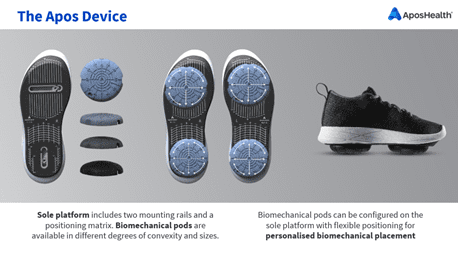Summary
AposHealth® tackles the elective care backlog, reduces the overall cost of care, and improves patient outcomes for the 4.5m patients suffering from severe knee osteoarthritis. This non-invasive, footworn medical device has been demonstrated to avoid joint replacement surgery in 84% of patients for at least two years (Greene and Miles, 2022).
"
AposHealth has had positive clinical outcomes for a significant number of our patients. Patients demonstrated a significant reduction in pain, improvement in daily functions such as getting dressed or going shopping and increased their walking speed by 16%. Most importantly, 98% of patients who were in treatment for at least 12 months would recommend AposHealth to their friends and family.
"
Mid-Essex NHS Clinical Commissioning Group
What the project involved
AposHealth® is an effective alternative to joint replacement surgery for end-stage knee/hip osteoarthritis. It is based on well-established biomechanical principles of reducing joint forces and muscle retraining to improve patients’ symptoms. The patented Apos® medical device provides the ability to address both critical factors of osteoarthritis and is the only one of its kind on the market.
As healthcare systems work hard to tackle the elective care backlog and reduce the health inequality because of the coronavirus (COVID-19) pandemic, patients suffering from moderate to severe knee osteoarthritis have very few effective treatment options other than surgery. For those eligible for joint replacement surgery, they face long waits, for those unsuitable for surgery, there is no effective non-invasive treatment.
AposHealth can help manage the growing and unsustainable demand for joint replacement surgery.
One of the key challenges for an SME like AposHealth is to ensure the foundation for adoption across the NHS is fully established. The path for uptake of medical devices is varied and, in many cases, unclear within the NHS, understanding funding mechanisms, engaging with key stakeholders and decision makers has been a challenge. AposHealth are currently undertaking a formal evaluation with NICE.
To try and encourage greater adoption and spread of the device, Apos applied to the AHSN Network’s Health Tech Connect service (now replaced by the NHS Innovation Service), which steered them towards the process of formal evaluation by NICE (Medical Technologies Guidance). This will help build credibility if selected as a NICE approved medical device. KSS AHSN have supported the company to build evidence; apply to the NHS Supply Chain procurement system; and facilitate introductions to stakeholders across the region.
Outcomes
Real-world evidence showed that use of the device can help delay the need for surgery or avoid it altogether, with 84% of NHS knee replacement candidates avoiding surgery for at least two years (Greene and Miles, 2022). This can increase surgical capacity by allowing prioritisation of patients based on clinical need. Patients with severe conditions or those unresponsive to AposHealth® treatment can be prioritised and those responding well to treatment can delay entering surgical waiting lists. As a result of the avoided surgeries, one mid-size Clinical Commissioning Group (CCG) achieved an estimated savings of £3,330 per patient.
Patients report a significant reduction in pain, improved function, and quality of life. This correlates with the results from a double-blind Randomised Control Trial published in The Journal of American Medical Association (JAMA) (Reichenbach et al. 2020). In addition, a significant improvement is also seen in objective gait metrics that are identified as risk factors in requiring joint replacement surgery and linked to increased mortality rates.
98% of patients would recommend the treatment to friends and family.
Next steps
Research and development is central to this innovation and the company continues to analyse outcomes for existing patients including collating and publishing real-world evidence as seen in their NHS programmes (for example, Greene and Miles, 2022).
There is growing evidence of benefits of using this device to treat those with hip and lower back pain. The company are also developing their digital health capability, using smartphone capability to analyse patients gait and calibrate the AposHealth device, to provide a fully remote model of care.
Draft NICE guidance has been issued that recommends the use of this innovation as part of the knee osteoarthritis care pathway in specific scenarios. The guidance is out for consultation until December 2022 and due to be published in 2023. Read the draft guidance on the NICE website.







